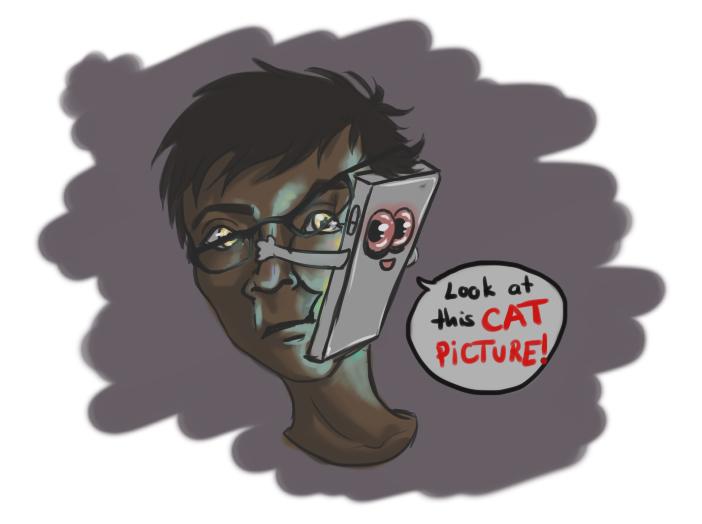When I went to the Verizon store last August, the salesperson thought I was crazy.
“You know, you’re the first person I’ve ever seen do this. I’ve gotta tell you, I think you’re making a mistake.”
My friends’ opinions were no different: “You’re just making your life more inconvenient to prove a point. Why are you doing this?”
I willfully ignored everyone’s reproaches. I had made my decision: I was giving up my smartphone.
By October 2014, 64 percent of Americans owned a smartphone, up from 35 percent in 2011. Why on Earth would anyone purposefully take a technological step backward? After all, my iPhone 5 had served me well in the past. I was able to talk and text with anyone anywhere at any time. I had the accumulated knowledge of mankind right at my fingertips.
I should have been completely satisfied with this miracle of technology, but I started to resent its outsized role in my life. When I was talking to someone in person and there was a momentary lull in conversation, I would immediately reach for my pocket. The average American opens a social media app 17 times a day, spending nearly five hours a day on their smartphones, and I was no exception. Just waiting for a red light to change seemed an intolerable bore and soon I was unable to get through one without checking my phone.
I realized that my relationship with my smartphone was analogous to a smoker’s relationship with cigarettes. Before you start smoking, you never want or “need” one. But once you get addicted, every cigarette relieves the stress that comes from having not smoked in a while. Cigarettes solve the very problem they create — temporarily.
So it was with my phone. Apple helped me realize that I, in fact, craved stimulation at all times. My phone was always there to set my attention span-less mind at ease — if only for a few minutes.
I’m not alone in my tech fatigue. Just last week, Kanye West tweeted: “I got rid of my phone so I can have air to create.” Louis C.K. similarly ranted on “Conan” three years ago, bemoaning the fact that phones have destroyed the ability of people “to just be a person.” “That’s what the phones are taking away,” he said, “the ability to just sit there.” The YouTube video of his diatribe has over 11 million views, clearly striking a chord with viewers.
In Canada, Toronto lawyers Steven Pulver and Daniel Levine have accomplished the wonderfully oxymoronic by creating a technology conference without the technology. Their Fireside Conference, started in 2014, is notable for forbidding usage of devices and being located in one of the few remaining corners of the Earth unpenetrated by cellphone reception. Attendees were reportedly jarred by having to ask strangers for directions around the site, an action they hadn’t performed in years due to the mass proliferation of GPS technology.
The number of participants for the Fireside Conference this year was double that of the previous. Increasingly, people are willing to brave inconvenience to get away from their phones.
I have not sworn off all technology. I make calls and write texts with my flip phone, but whenever I’m in Wi-Fi I use my iPod Touch to iMessage instead. I maintain an Instagram and Facebook account. But I inhabit the virtual world far less than I had before.
My fingers don’t get itchy when I’m not talking directly to someone. I can sit through a movie without playing Candy Crush. I can go out with my friends without documenting my movements to the world just to prove I do fun things. I can come up with a funny observation without needing to put it on Twitter. I can sit at a red light and stay entertained by people-watching.
I’ve been the subject of ridicule among my friends and family, but I absolutely do not regret my decision. I don’t deny the benefits of technology and have no desire to shut them completely out of my life. I instead have admitted my inability to resist the cry of my phone and adjusted my behavior accordingly. Louis C.K. would be proud: for the first time in years, I can sit down without stimulation and just “be a person.” It sounds simple, but it’s much easier said than done.
Without my smartphone, I cannot fill every moment of my time with mindless scrolling to avoid the difficult business of introspection. I cannot drown my anxieties in a sea of cat videos and memes. Sometimes, this leads to intense discomfort. Avoiding stressors may lessen anxiety in the short term, but in the end it always is the mental equivalent of throwing gasoline on the fire.
By giving up my phone, I’ve learned to confront my problems and expose myself to mini-existential crises. But through those trifles I have emerged a more emotionally secure and less stressed person.
It is easy to point out the material advantages of owning a pocket computer, snatching up the newest iPhone and being able to document your most magnificent moments as they’re happening. But I lost touch with myself in all of that.
Ultimately, the comfort of sanity outweighs inconvenience.


